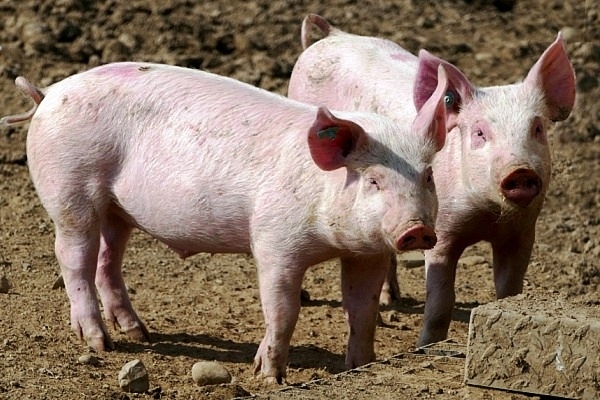
Northeast State Suspect African Swine Flu Outbreak After Pig Deaths, Believed To Have Spread From Tibet
Even as novel coronavirus infections in northeast India are comparatively under control so far, the eight northeastern states are staring at a new threat -- African Swine Flu (ASF), which is suspected to be behind the mysterious deaths of hundreds of pigs.
Animal resource experts in northeast India suspect that the highly contagious ASF came to the region from Tibet in China through Arunachal Pradesh. Four of the eight northeastern states are free from coronavirus whereas its spread has been tamed in other four states.
Besides Assam and Meghalaya which have reported suspected ASF in total 15 districts, other states governments in the northeast have sounded a high alert and asked people, especially owners of piggeries, to refrain from bringing pigs from other states.
Assam Agriculture and Veterinary Minister Atul Bora confirmed the deaths of over 2,260 pigs in state's six districts due to suspected ASF, with authorities waiting for confirmatory reports from the National Institute of High Security Animal Diseases in Bhopal.
The Meghalaya government has already banned the transport of pigs from outside the state after the deaths of pigs in some districts of Assam and Arunachal Pradesh.
Meghalaya's Deputy Chief Minister Prestone Tynsong on Wednesday said that the state issued a notification on Monday to ban ferrying of pigs from other states.
"We have advised people to consume adequately cooked pork only (above 70 degrees celsius for at least 20 minutes)," the Deputy Chief Minister, who is incharge of Animal Husbandry and Veterinary Department, told IANS over phone from Shillong.
The Meghalaya Animal Husbandry and Veterinary Department's Principal Secretary Shakil P Ahamed said in a notification that all government and private pig farms and pig owners should take adequate and strict measures for hygiene and bio-security such as disinfection of farms/piggries and other equipment and restrict outsiders'' entry to pig farms.
"Signs of high fever in pigs and any abnormal mortality should be brought to the notice of the authority concerned," said the notification.
According to animal resource experts, pigs generally are affected by Classical Fever, Porcine Reproductive and Respiratory Syndrome (PRRS), besides the ASF.
Tripura's Animal Resources Development Department Director and Additional Secretary Dilip Chakma told IANS that after ASF outbreak in six districts of Assam and nine districts of Arunachal Pradesh, his department has alerted all government and private pig firms and pig owners to take adequate measures to prevent the disease.
According to the Meghalaya government notification, the unusual mortality of few thousands of pigs were reported from Dhemaji, North Lakhimpur, Biswanath, Dibrugarh, Sivasagar and Jorhat districts of Assam and in West Kameng, Papum-pare, Lower Siang, Upper Siang, East Siang, Lohit, Lepa-Rada, Namsai, Changlang districts of Arunachal Pradesh.
Assam's Minister Atul Bora said: "The pigs are dying of a foreign virus and we guess that it may have come from Tibet in China. Reports of pigs'' deaths in Arunachal Pradesh were reported in the first week of April. Many villagers in the state threw the carcasses of dead pigs into a river which flows down to Assam, causing pig deaths in Dhemaji district which borders Arunachal Pradesh."
According to the minister, over 2,260 pigs have died in Assam''s six districts so far. "This foreign virus spreads very fast. The Assam government had on April 25 banned the procurement and sale of pigs and pork, shut all slaughterhouses and banned movement of people associated with piggeries from one place to another place," Bora said.
He said that normally this is a period for swine flu in pigs in Assam. "We have vaccinated animals against Classical Swine Fever disease."
According to 2019 census, the population of pigs in various Assam farms was 21 lakh.
In Aizawl, Mizoram Animal Husbandry and Veterinary Science Department officials said that the recent outbreak of PRRS disease in Mizoram has been contained.
Fresh PRRS cases were reported in Mizoram in January and February after some pigs imported from neighbouring Myanmar were found infected. The ASF was first detected in Kenya in 1909, which spread across Europe and the America in the 1960s and 80s.
The story has been published via a syndicated feed, only the headline has been changed